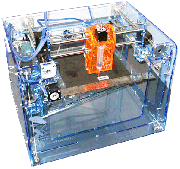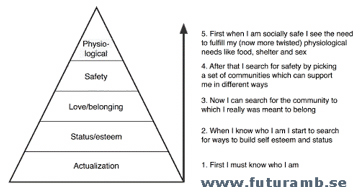Backlog
 So, gone for about a week, followed by a week of meetings and deadlines, and I end up with a serious backlog of interesting/cool/relevant links that really should blog more thoroughly. Rather than bemoan my fate and slowly trickle them out until I get overwhelmed by more current material, I'll just go ahead and bullet point 'em with very short explanations as to why.
So, gone for about a week, followed by a week of meetings and deadlines, and I end up with a serious backlog of interesting/cool/relevant links that really should blog more thoroughly. Rather than bemoan my fate and slowly trickle them out until I get overwhelmed by more current material, I'll just go ahead and bullet point 'em with very short explanations as to why.
Here's some of what's been swimming around in my extended headspace for the last couple of weeks:
• Fab @ Home is an open source project out of Cornell, via MIT to create DIY blueprints for a basic fabber. More than that, they're aiming for a universal fabber able to use multiple materials in one object, in order to produce "complete, active systems." The big question: will they get to a working version before a relatively inexpensive commercial product comes out? That is, who will define the market -- the open source method or the proprietary method? (via)
• Healthmap is a Google Maps mashup showing geographic links to news stories about emerging global diseases. This is sort of the quick & dirty version of Larry Brilliant's INSTEDD project.
• Tracking the Threat is like Healthmap for terrorism: a Google Map mashup showing geographic links to news stories about al Qaeda. Both Healthmap and Tracking the Threat are prime examples of the modern era of Open Source Intelligence.
• US Congress looking into Metaverse economies, just as Julian Dibbell predicted (and I wrote about, as well). Lots of numbers get thrown around, but I suspect the trigger will be whether the virtual money is usable outside of the virtual world -- that is, can I buy something non-virtual with it? In the case of World of Warcraft gold pieces, no; in the case of Second Life lindens, yes, making it a complementary currency, and likely taxable.
 • Martin Börjesson wonders whether the traditional concept of Maslow's Hierarchy of Needs -- physiological first, then safety, then love, then status, and lastly actualization -- has in fact been reversed by modern culture. Not a lot of detail, but a truly provocative argument.
• Martin Börjesson wonders whether the traditional concept of Maslow's Hierarchy of Needs -- physiological first, then safety, then love, then status, and lastly actualization -- has in fact been reversed by modern culture. Not a lot of detail, but a truly provocative argument.
• Mobile phone ATM in Uganda, similar to mobile phone banking in Kenya, is a paradigmatic example of "the street finds its own uses for things." (-Wm. Gibson) It's not the phone itself that works as an ATM, but the mobile phone system, including transferrable minutes and phone cards. (via)
• Face Recognition for Secure Phones uses a mobile phone's camera to identify whether the person holding the phone is the authorized user. It's slow and requires 3-10 calibrating photos, but it's a distant early warning of the era of mobile devices with face recognition capacity.
• Solar Electric Light Fund made it possible for Pop!Tech 2006 to be "double carbon neutral." Pop!Tech purchased enough carbon offsets from SELF to cover the travel of all participants twice over, by underwriting the deployment of solar electricity systems to 44 villages in Benin. That absolutely rocks.
Technorati Tags:
Jamais Cascio, Julian Dibbell, Fabrication , Participatory Panopticon, PopTech, Solar Electric Light Fund, Face Recognition software, Open Source Intelligence, INSTEDD, Futuramb






Comments
Fab@Home is inspired by MIT, but it's actually based out of Cornell University, according to the Installations page
Posted by: Nato Welch | October 31, 2006 6:29 PM
Whoops, thanks, Nato!
Posted by: Jamais Cascio | October 31, 2006 9:59 PM